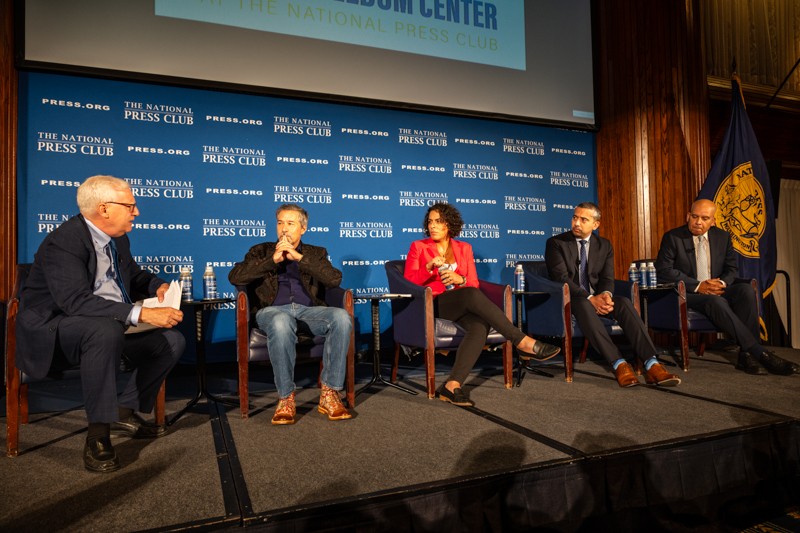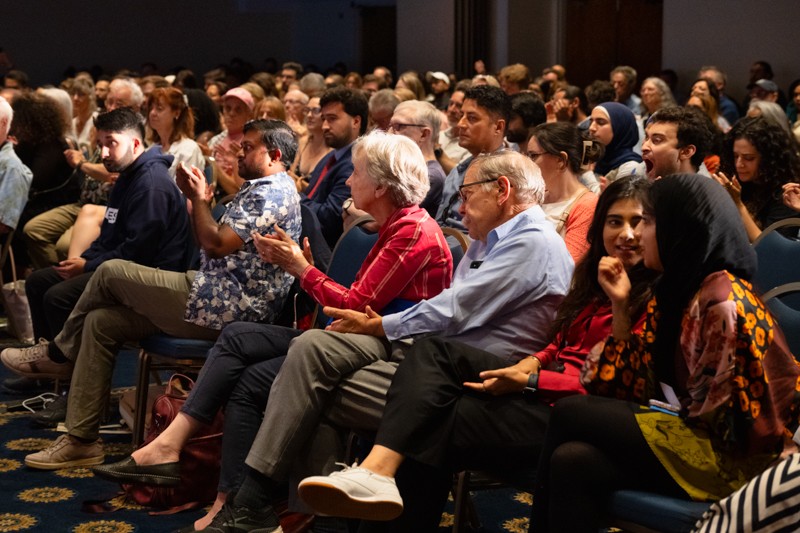‘She was the voice’: Journalists call for justice, accountability in Shireen Abu Akleh’s killing
The killing of Palestinian-American journalist Shireen Abu Akleh was not only a tragedy, it was a call to action.
That was the central message from a film screening and panel discussion held July 9 at the National Press Club, where journalists gathered to honor Abu Akleh’s legacy and demand accountability for her death in 2022. She was killed while reporting on an Israeli military operation in the West Bank.
The event, hosted by the Club’s Press Freedom Center, featured the documentary "Who Killed Shireen?," which presents evidence that Abu Akleh was shot by an Israeli sniper from an elite unit. The film, commissioned by Zeteo and produced by District Bear Films, challenges official narratives and underscores the systemic risks faced by journalists in conflict zones.

Panelists included Mehdi Hasan of The Intercept, Dion Nissenbaum, formerly of The Wall Street Journal, Jihan Abdallah of The National, and Abderrahim Foukara of Al Jazeera. Each offered personal reflections and urgent calls for reform.
“She was the voice,” said Abdallah, who described Abu Akleh as a humble and courageous reporter who brought Palestinian stories to the world. “She went everywhere that we couldn't go because of the conflict. She loved her job immensely and loved her people immensely. And it hurts me. It hurts me very much that this happened to her.”
Hasan praised the film’s investigative depth and its mission to challenge silence.
“Just the journey and telling Shireen’s story — and seeing the Israeli and Biden administration cover-up — is worth it,” he said. “But they actually went and found the soldier, with all the twist of him being dead.”
Hasan also emphasized the importance of independent platforms like Zeteo.
“The reason Zeteo exists is to do stuff like this — to platform films and voices that aren't being heard and seen elsewhere,” he said.
Nissenbaum, who led the film’s reporting, underscored the need for bold journalism that goes beyond official channels.
“In the Western media, there's not enough people doing the kind of journalism like this where you actually put some skin in the game to find out what's happening,” he said. “We wanted to see why no one was held to account, why the Biden administration didn't do more to find out who killed the first American journalist by Israeli forces.”
The soldier identified in the film was arrested a week before its release and is being held without charge, Nissenbaum said.
“This is a very live story and it's important that we keep a focus on it,” he said.

Foukara reflected on Abu Akleh’s integrity and influence.
“Shireen on the screen was the same as Shireen in her daily life,” Foukara said. “She liked to keep a low profile, which is not very common among us, you know, who have a screen persona. She didn't seem to care about that. She seemed to care about the content, the story that she did.”
He also spoke to her impact on future generations of journalists.
“She held a light for many journalists in Palestine and in the Arab world,” Foukara said. “If somebody holds that light, aspiring journalists will see it and it will impact them.”
The panel criticized the lack of accountability from Israeli and U.S. authorities and warned of the broader erosion of press freedom. Sen. Chris Van Hollen (D-Md.) appeared via video message, calling for justice and transparency.
The evening closed with a shared conviction: that journalism must continue to shine light in the darkest corners, and that Shireen Abu Akleh’s legacy demands nothing less.
